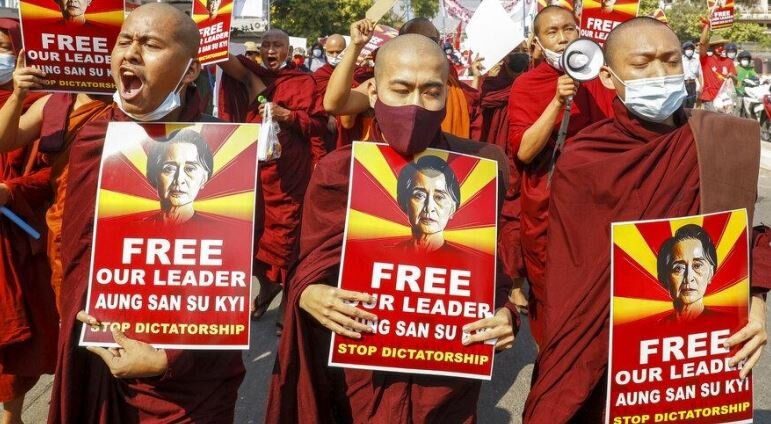THE MYANMAR COUP
By Charlotte Fox
Myanmar, formerly named Burma, is a country in South-East Asia which recently experienced a coup d’état, which is defined as “an illegal, unconstitutional seizure of power by a political faction, the military, or a dictator” (1). It occurred on the 1st of February 2021, one day before the members of the National League for Democracy party (NLD), led by Suu Kyi, were to be sworn into the Parliament due to their success at the 8th of November 2020 Myanmar general election (2).
The Tatmadaw (Myanmar's military) forcefully took away power from the NLD and arrested Suu Kyi (3), meaning that she could not be sworn into Parliament as planned. The Tatmadaw tried to justify this by claiming that the election results were incorrect and so there needed a re-election was necessary. This claim was denied by the Union Election Commission (4), and it is instead believed that the reason for the coup was that the Tatmadaw wanted Myanmar to be a stratocracy; this would mean the military would oversee the government. However, for the civilians of Myanmar, this is very similar to a dictatorship, which is why there were huge protests as a response to the coup. In an attempt to control these protests, the military placed curfews (3) and restrictions to large gatherings in many areas across Myanmar, often under the guise of “COVID-19 restrictions,” but this has not stopped Burmese civilians from fighting for their right to democracy.
After the coup, Min Aung Hlaing, the leader of the Tatmadaw, told the public that he is on their side, and vowed to create a “true and disciplined democracy,” with a "free and fair" election (2). Since the Myanmar protests against the coup are still ongoing, it is unknown whether the new government will take any further action against the civilians protesting, or give into their demands and step down, giving the power back to the NLD, as is rightly deserved.
In addition to the protests against the coup that are occurring in Myanmar, there is also some international involvement. Whilst neighbouring countries, including Cambodia, Thailand, and the Philippines have expressed their neutral position on the situation, the coup has been criticised by many democratic nations, such as the USA (2). The President of the USA, Joe Biden, has enforced sanctions on members of the Burmese government who played an important role in the coup, in order to pressure them into reversing the coup and releasing Suu Kyi from prison (5). The sanctions that Biden has ordered are economic, and involve preventing the Tatmadaw from being able to access $1 billion in government funds, therefore reducing its power, and also abandoning any US resources that would benefit them (5). Despite the fact that there is currently an economic recession due to the COVID-19 pandemic, meaning that the use of sanctions puts more pressure on the already unstable US economy, Biden appears confident that these sanctions are the solution to the violation of the Burmese people’s democratic rights.
Sources:
(1) https://en.wikipedia.org/wiki/Coup_d'%C3%A9tat
(2) https://www.bbc.co.uk/news/world-asia-55902070
(3) https://www.bbc.co.uk/news/world-asia-55882489
(4) https://www.theguardian.com/world/2021/feb/12/election-officials-held-in-myanmar-in-bid-to-prove
(5) https://www.bbc.co.uk/news/world-asia-56015749
